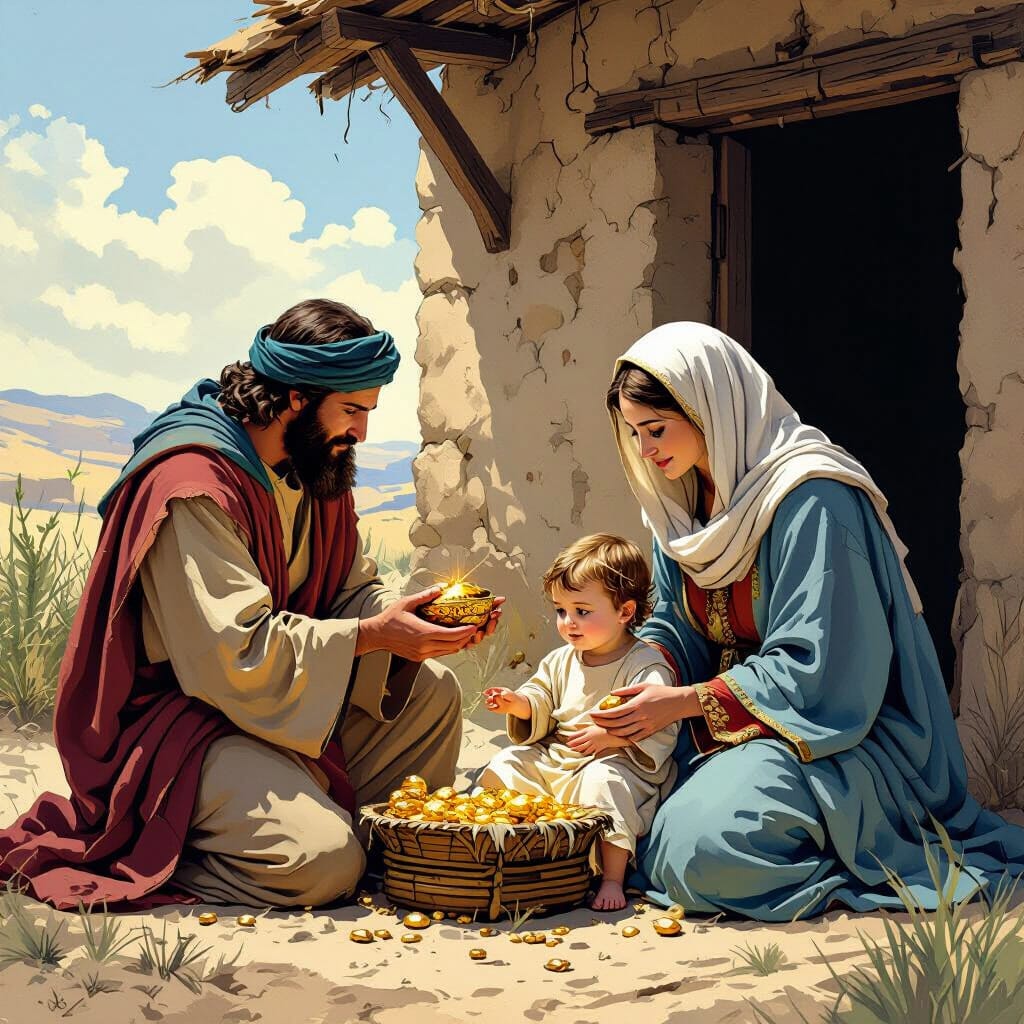Children of God
In the New Testament, the followers of Jesus are called children of God, or disciples. Jesus called twelve men to be His first disciples (Matthew 10:2-4, Mark 3:16-19, Luke 6:13-16), but later called 70 to join them in ministry (Luke 10:1-20). After He rose from the dead, He told His followers to wait until the Holy Spirit came to them with the same power He had, before going into all the world to preach the Gospel. When that occurred (Acts 1 & 2), there were around 120 of His closest followers, including His mother, Mary, and other women who had supported Him. That same day, around 3,000 people received Jesus. Today, Jesus has billions of followers. More than any other religion on the planet.
Mary
The first miracle recorded in the New Testament is also the first two prophecies fulfilled regarding the Messiah—the virgin birth of baby Jesus in Bethlehem. In the lineage of Abraham and David, Joseph became the husband of Mary. They both got way more than they were expecting with this marriage. It started when God sent the angel, Gabriel, to Mary, before the marriage was consummated. Gabriel told her she had found favor with God, and would conceive, and give birth to a son who would be named Jesus. Mary asked Gabriel how this could happen, since she was still a virgin. Gabriel told her the Holy Spirit of God would come upon her and her baby would be the Son of God. Mary accepted Gabriel’s message without doubting, then went to stay with her cousin, Elisabeth, as Gabriel had told her Elisabeth had conceived a son, despite being old and barren. Her son would become John the Baptist. When Elisabeth heard Mary’s greeting, her baby lept in her womb. She spoke a blessing on Mary, knowing by the Holy Spirit she was carrying the Lord. After three months, Mary returned home to Nazareth (Luke 1:26-56).
When Joseph found out Mary was pregnant, and not by him, he planned to end the marriage privately, without causing her to (cont.)

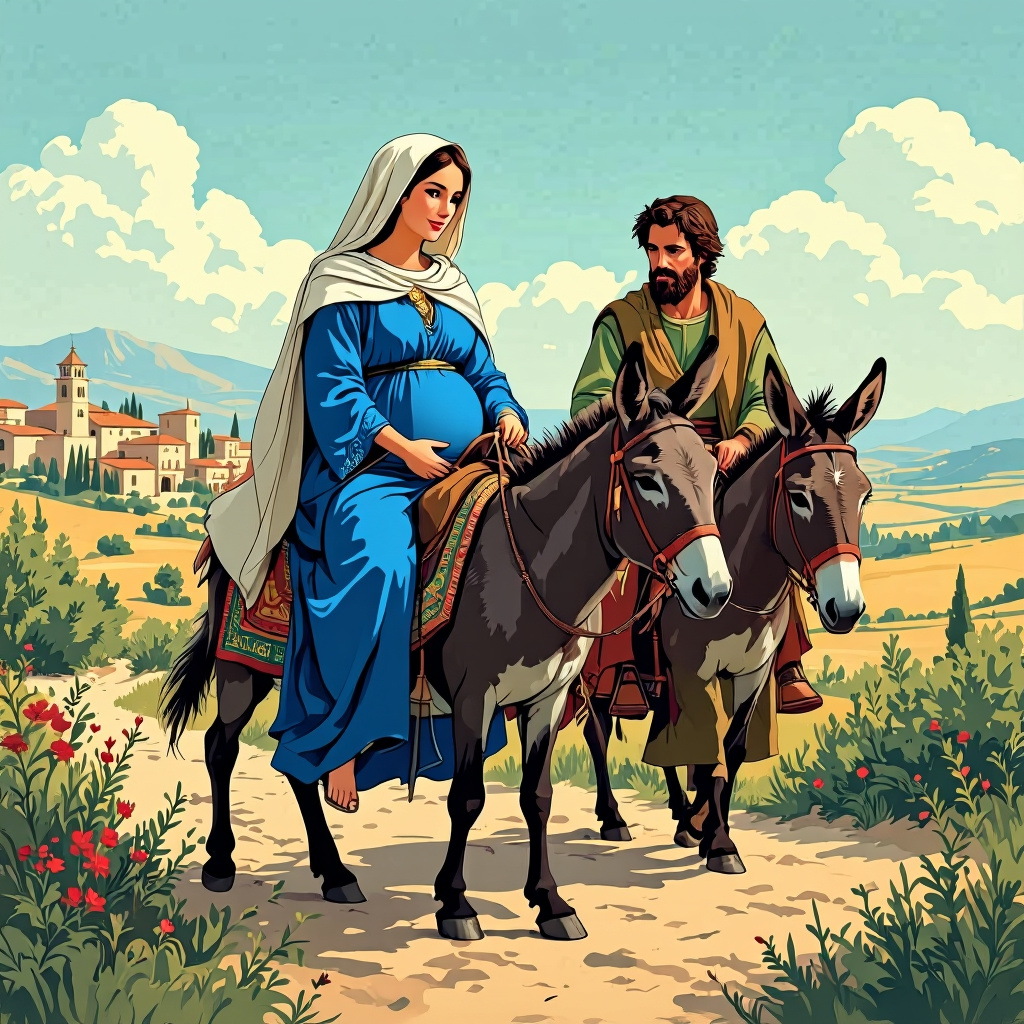
be publicly humiliated. However, an angel told him in a dream that Mary had conceived by the Holy Spirit, and she would have a son whom he would name Jesus, and He will save His people from their sins. Joseph kept Mary as his wife and didn’t consummate the marriage until after Jesus was born (Matthew 1:16-25).
To add further “complications” with this pregnancy, when Mary was close to delivering, Caesar Augustus sent out a decree that every man must return to his hometown to pay a tax. So, Mary and Joseph went to Bethlehem, the city of David. There, she gave birth to Jesus in a stable because there were no rooms available due to the crowds there to pay their taxes. An angel appeared to shepherds in a nearby field and proclaimed the birth of the Savior and Lord in the city of David. He told them the baby would be wrapped in swaddling clothes and lying in a manger. Then many angels appeared proclaiming Glory to God in the highest, peace on Earth and goodwill toward men. When the angels disappeared, the shepherds went quickly and found Mary and Joseph with baby Jesus lying in the manger. After receiving this honor, they went and told the story throughout the region. Mary and Joseph soon brought Jesus to the temple in (cont.)
Jerusalem to present Him to the Lord and make a sacrifice. There, a devout man named Simeon, led by the power of the Holy Spirit, was waiting for them and proclaimed a blessing over Jesus as the promised Messiah (Luke 2:1-35).
Wise men from the east, who had followed the star from the time of Jesus’ birth, came to Jerusalem to worship Him as the new king of the Jews. King Herod learned of this and was told by the priests and scribes that the new ruler of Israel would come from Bethlehem. Herod told the wise men to go there and find the young child (now around two years old) so he could worship Him also (but actually wanted to kill Him to retain power). The wise men followed the star to a house where Jesus was. They bowed before Him and gave gifts of gold, frankincense, and myrrh. God warned them in a dream to not return to Herod, so they returned to their country another way. An angel then appeared to Joseph in a dream and told him to flee to Egypt (fulfilling prophecy) with the young child and his mother until further notice, because Herod wanted to kill Jesus. When Herod discovered that the wise men had eluded him with the whereabouts of Jesus, he ordered the death of every child in the Bethlehem area from two years old and under (also a prophesied event). When Herod died, the angel again appeared to Joseph in a dream and told him so, and to take his family back to Israel. Since Herod’s son now reigned, Joseph cautiously opted to settle in Nazareth (Matthew 2).
John the Baptist
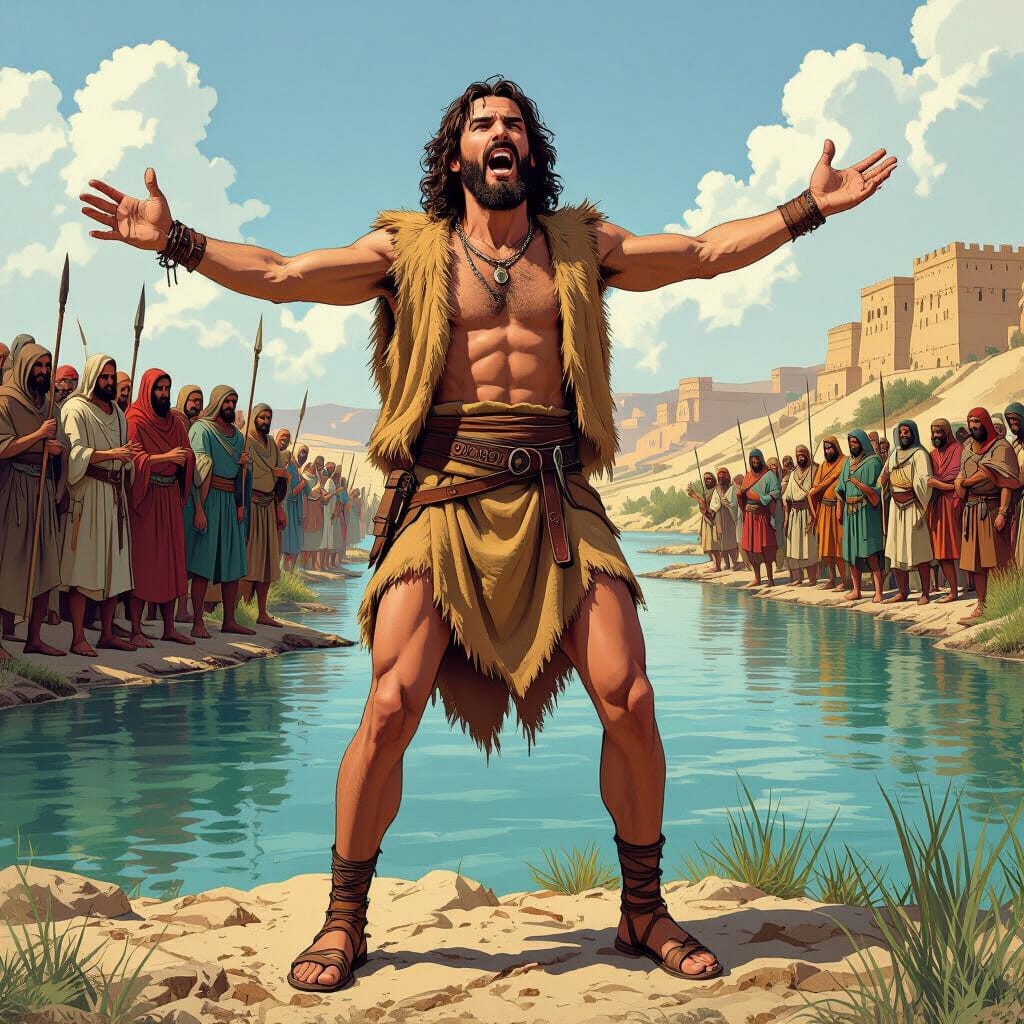
As we read in Mary’s story, John the Baptist also had a supernatural birth story. His mother, Elisabeth was old and barren. However, she and her husband, Zacharius, were dedicated to God and He sent the angel Gabriel to Zacharius. Gabriel told him his prayer was answered, and his wife would bear a son, and be named John. Also that John would be great in God’s sight, be filled with the Holy Spirit even before he was born, and prepare and lead many to the Lord. When Zacharius spoke doubt about this message, Gabriel struck him dumb until John was born (Mark 1:5-25, 57-80).
John’s mission was to prepare the people of Israel for the soon-coming Messiah. He preached in the wilderness and drew people out of Jerusalem, Judaea, and the region around Jordan. He told people to repent because the kingdom of Heaven was at hand. His ministry was prophesied by Isaiah (Isaiah 40:3-5). He baptized many in the Jordan River. He said he baptized with water for repentance, but there was One coming who was far greater than him who would baptize with the Holy Spirit and fire. He also called out the Pharisees and Sadducees for their opposition to his message. I’m sure they didn’t like his fashion sense or manners, either. He dressed in (cont.)
camel’s hair and leather, and ate locusts and wild honey. Jesus, his physical cousin, came to him to be baptized. John identified Him as the Lamb of God who takes away the sin of the world. He felt he wasn’t worthy to baptize Him, but Jesus needed John to fulfill their mission. As Jesus was baptized, the heavens were opened and the Holy Spirit descended on Him. A voice from Heaven said Jesus was His beloved Son, in whom He was well pleased. John was later thrown in prison and beheaded due to his strong stand against the sins of Herod, the Roman-appointed king of Judaea (Matthew 3:1-17;14:1-12, Mark 6:14-29, Luke 3:2-22, and John 1:29-34). Some consider John the first Christian martyr. Even though he wasn’t murdered for preaching the Gospel, he was killed for standing up for Biblical morality due to his faith in Jesus.

Peter
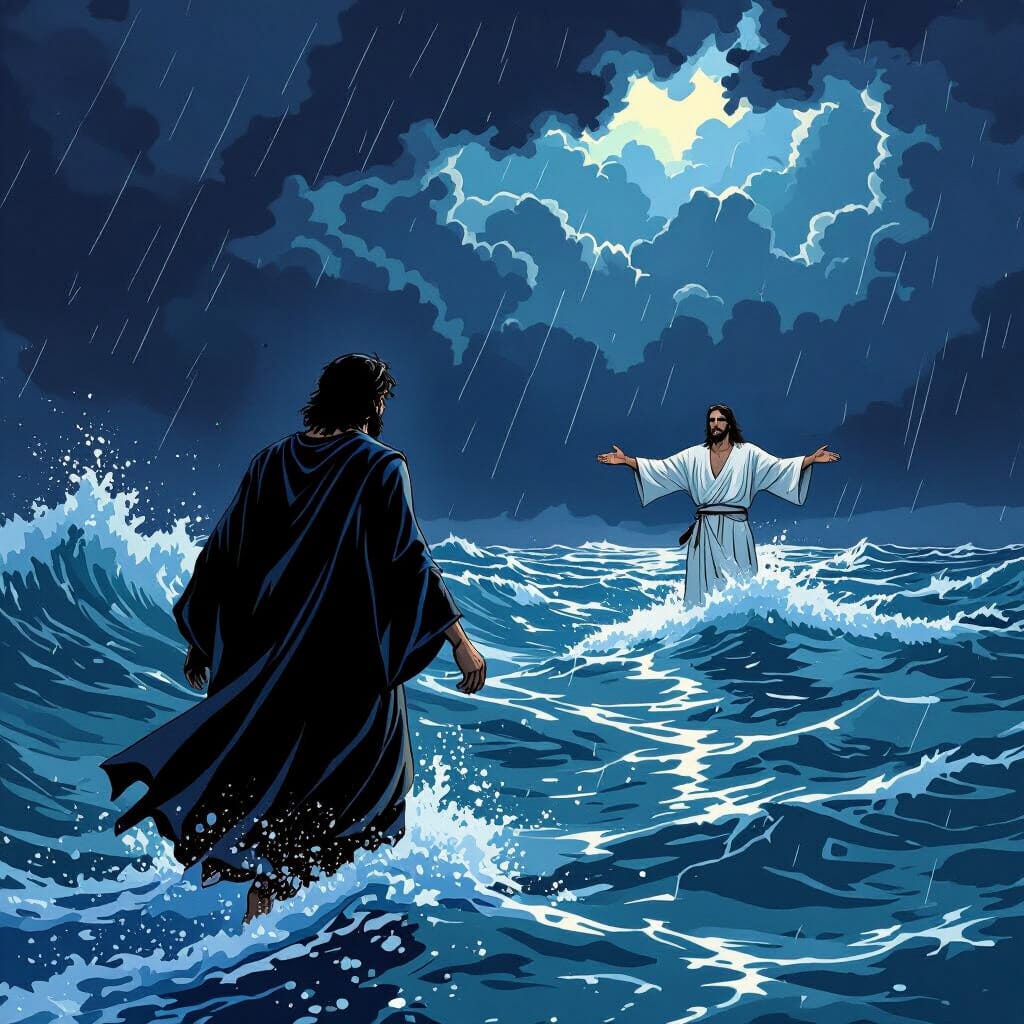
Peter, a fisherman turned fisher of men, often spoke before thinking things through. Sometimes it backfired, like when Jesus said to him, “Get behind me, Satan” (Matthew 16:21-23, Mark 8:31-33). But other times, it set him apart from the other disciples, such as when he was the first to say that Jesus was the Messiah, the Son of the living God. For this, Jesus changed his name from Simon to Peter, which means “rock” (Matthew 16.15-18). On another occasion, Peter’s quick response resulted in a seemingly impossible miracle nobody else has ever done besides Jesus—walking on water. When the disciples were rowing across the Sea of Galilee without Jesus on board, a strong wind came up in a direction contrary to their intended destination. While praying from a neighboring mountain Jesus saw their struggle and came to them walking on the water. The disciples were afraid and thought Jesus was a ghost, but Jesus said they shouldn’t be afraid because it was Him. Apparently, Peter wanted proof, and told Jesus that if it was Him, to tell him to come to Him on the water. Jesus said come, and Peter got out of the boat and walked on the water. On his way to Jesus, he took his eyes off Jesus, looked at the wind and waves, and started to sink. (cont.)
Not, “immediately dropped into the water,” but merely started to sink. Jesus was able to catch his hand and walk him back to the boat. Interestingly, though, Jesus didn’t encourage him with words such as, “Great job, Peter, You rock!” Instead, He told Peter he had little faith, and questioned why he doubted, even before walking Peter back to the boat. Once in the boat, Jesus made the wind stop suddenly (Matthew 14:23-33). So, unless you’ve walked on water, and didn’t start to sink, don’t think you’ve reached the peak of faith’s possibilities. Jesus said all things are possible to those who believe (Mark 9:23).
One morning, soon after Jesus ascended to Heaven, Peter and John were entering the temple for prayer. There, a man lame from birth, who was laid at the temple gate daily, asked for alms. Peter didn’t have any coins on him at the time, but offered something way better. He told the man to get up and walk in the name of Jesus Christ of Nazareth, took him by the hand, and lifted him up. Immediately, his feet and ankles received strength, and he entered the temple with them, walking, leaping, and praising God. All the people who saw him knew he had been laid at the gate daily asking alms, and (cont.)
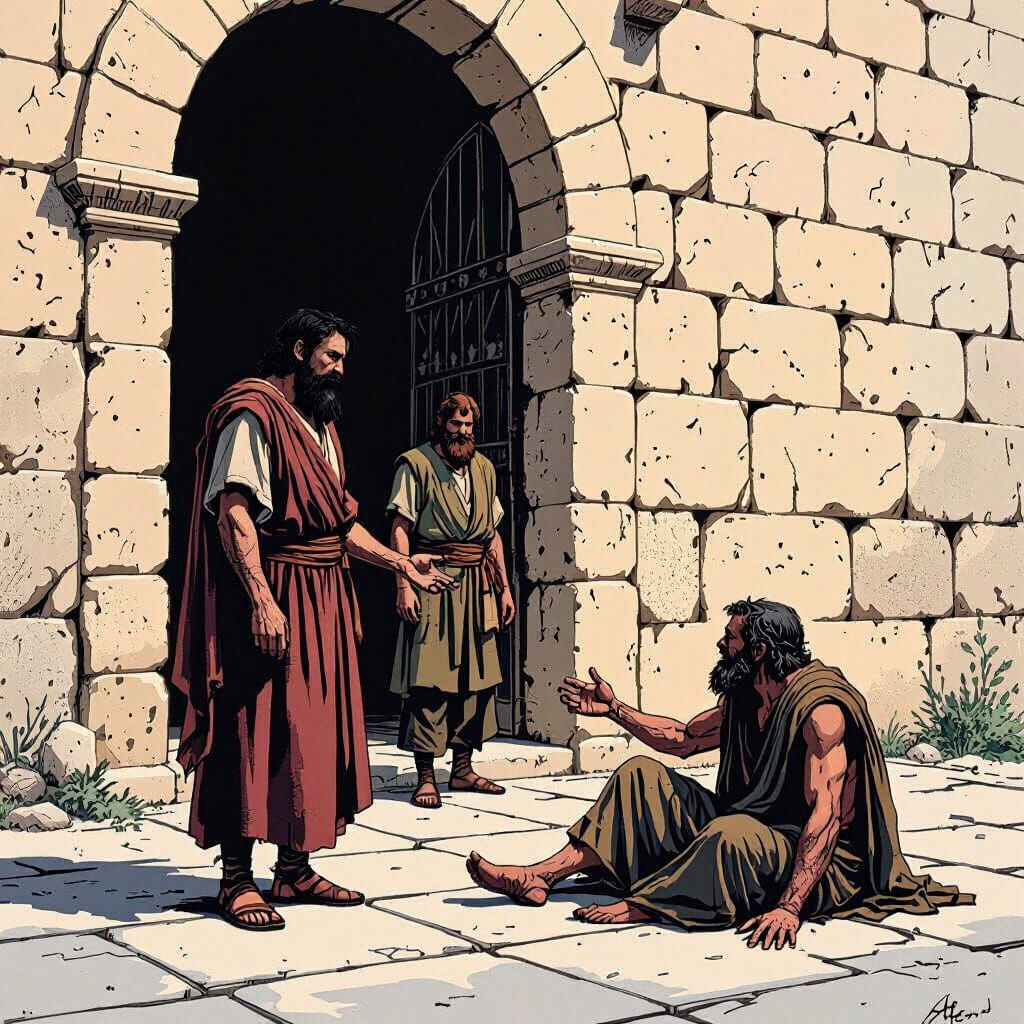
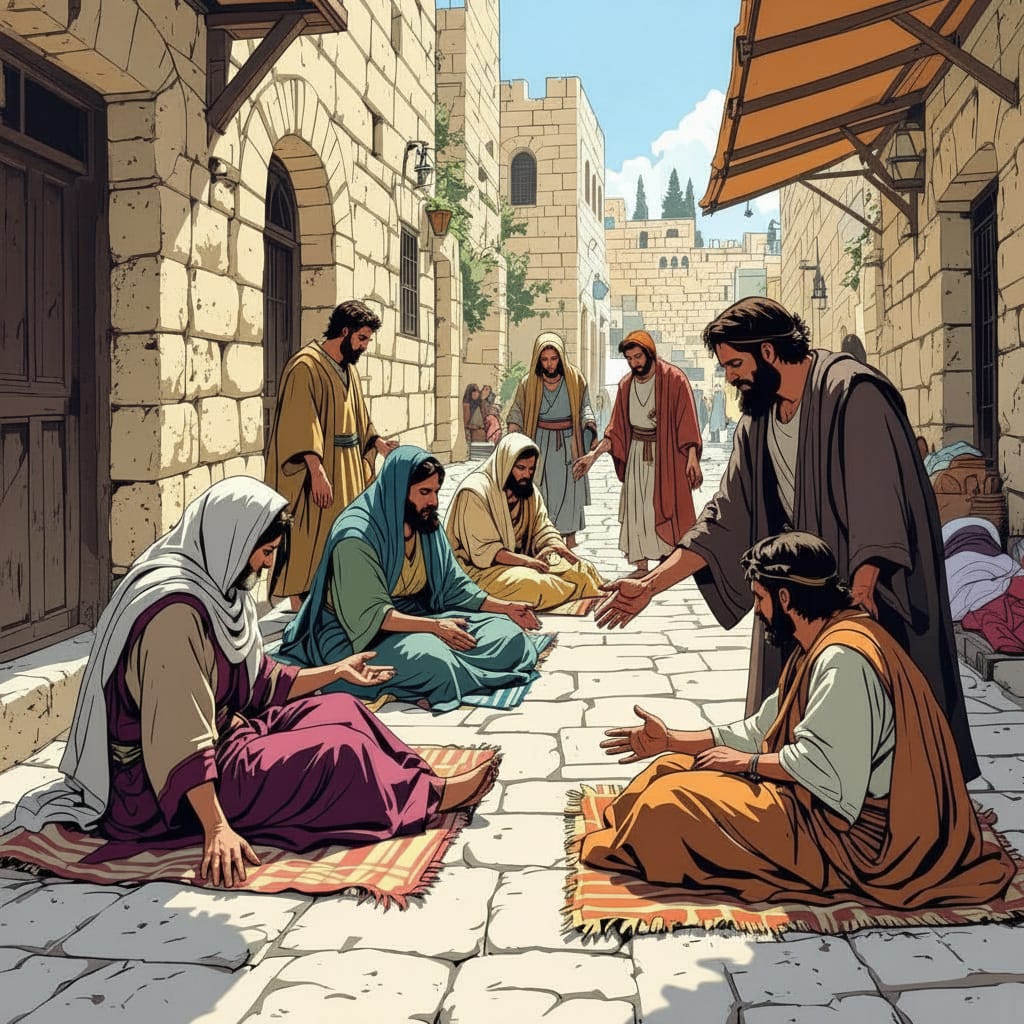
gathered around them in awe. Peter began preaching that this power came from faith in Jesus. He recounted the Old Testament prophets who foretold the Messiah would come and tied it together with Jesus’ death and resurrection of recent days (Acts 3).
As Peter and John spoke, the temple priests and Sadducees confronted them, as the religious leaders had done to Jesus. Peter and John didn’t back down and were held overnight as the leaders decided what to do with them. The next day, the council of religious leaders commanded them to stop preaching the name of Jesus and let them go free. However, Peter openly defied their order, and around 5,000 people believed on Jesus (Acts 4:1-22).
Peter and the other apostles (people sent on a mission) did many signs and wonders among the people to such a degree that people laid the sick in the streets and on beds hoping that even the shadow of Peter might fall on them and heal them. Many came from cities surrounding Jerusalem, bringing sick and demon possessed people, and every one of them was healed or delivered. Multitudes of men and women began believing in Jesus. Again, the religious leaders rose up against them and put many of the apostles in prison. (cont.)
But an angel came at night, opened the prison doors and told them to go back to the temple and keep preaching words of life. The next morning, the high priest called the council and all of the senate of Israel together, and sent for the prisoners to be brought before them. They discovered that the prison doors were locked and guarded, but no one was in the cells. Then a man came and reported that the men who they out in prison were teaching in the temple. They brought them before the council and the high priest again told them not to preach in Jesus’ name. Peter and the other apostles said they would rather obey God than man, and preached Jesus, repentance and forgiveness of sins directly to them, and pointed out that they were the ones who had crucified Jesus. Hearing this, they sought to kill them, but a Pharisee named Gamaliel argued against it. He said if they were false teachers, the movement would die out as others had in the past. But if it was of God, they wouldn’t be able to stop it and would be fighting God. They agreed, but still beat the apostles and told them not to preach the name of Jesus, before letting them go. The apostles rejoiced that they were counted worthy to suffer for Jesus. They continued teaching and preaching daily in the (cont.)
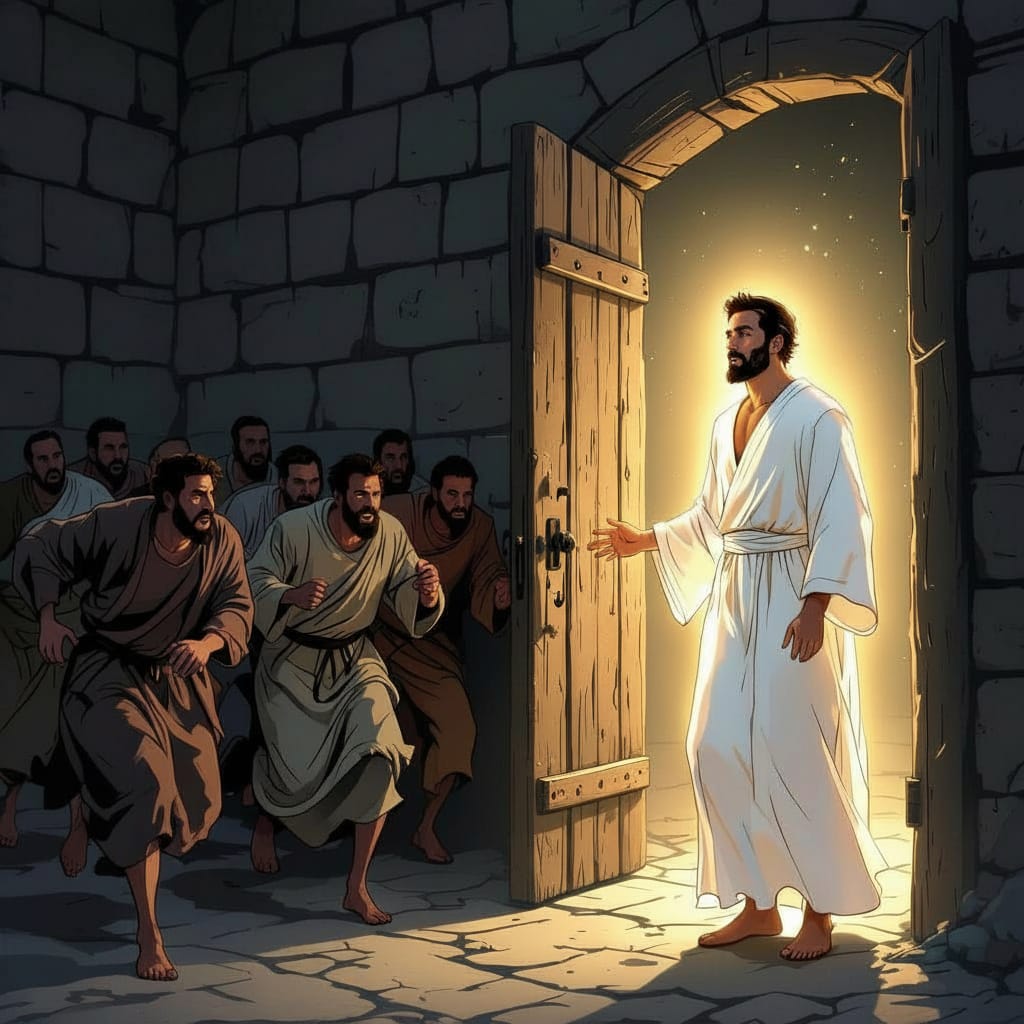

temple, and in every house (Acts 5:12-42).
Peter began traveling throughout the whole region, preaching and healing. In Lydda, he found a man named Aeneas, who had been paralyzed for eight years. Peter proclaimed his healing through Jesus Christ and Aneas arose immediately. Everyone living in Lydda and nearby Saron who saw Aneas, turned to the Lord. Also nearby was the city of Joppa. A dedicated, generous disciple living there, named Tabitha, became sick and died. Disciples there heard Peter was in Lydda and sent two men to request his presence. Peter went with them the next morning and they took him to where the body of Tabitha lay in an upper chamber. There, widows were weeping and showing each other the clothing Tabitha had made for them in their time of grief. Peter cleared the room, kneeled down and prayed. He turned to the body and told Tabitha to arise. She opened her eyes and sat up. Peter lifted her by the hand and presented her alive to the widows and other disciples. Word of this miracle spread throughout the whole city and many believed in the Lord (Acts 9:32-42).
Stephen
As the number of disciples multiplied, a modest dispute arose between the Grecians and Hebrews over the care of widows. The twelve apostles called a meeting with many disciples to resolve the issue. They decided to appoint seven of the most honest and wise men full of the Holy Spirit to handle the matter. One of these was Stephen. He was full of faith and power, and did great wonders and miracles among the people as more and more disciples were added in Jerusalem. Even many of the priests, who had formerly opposed the faith, now followed Jesus. Still, some in the synagogue of the Libertines, Cyrenians, Alexandrians, and of Cilicia and Asia, came against him when he spoke with great wisdom. They stirred up the people, elders, and scribes and forced him to their council, where they set up false witnesses claiming Stephen spoke blasphemous words against the temple and the law of Moses (in the Old Testament). Then Stephen’s face appeared to the council as the face of an angel, which likely meant it started to glow (Acts 6).
Stephen began to detail the miraculous history of their shared faith in the God of Abraham, Isaac, Jacob, Joseph, and Moses, often quoting their own scripture. He then recalled how their (cont.)
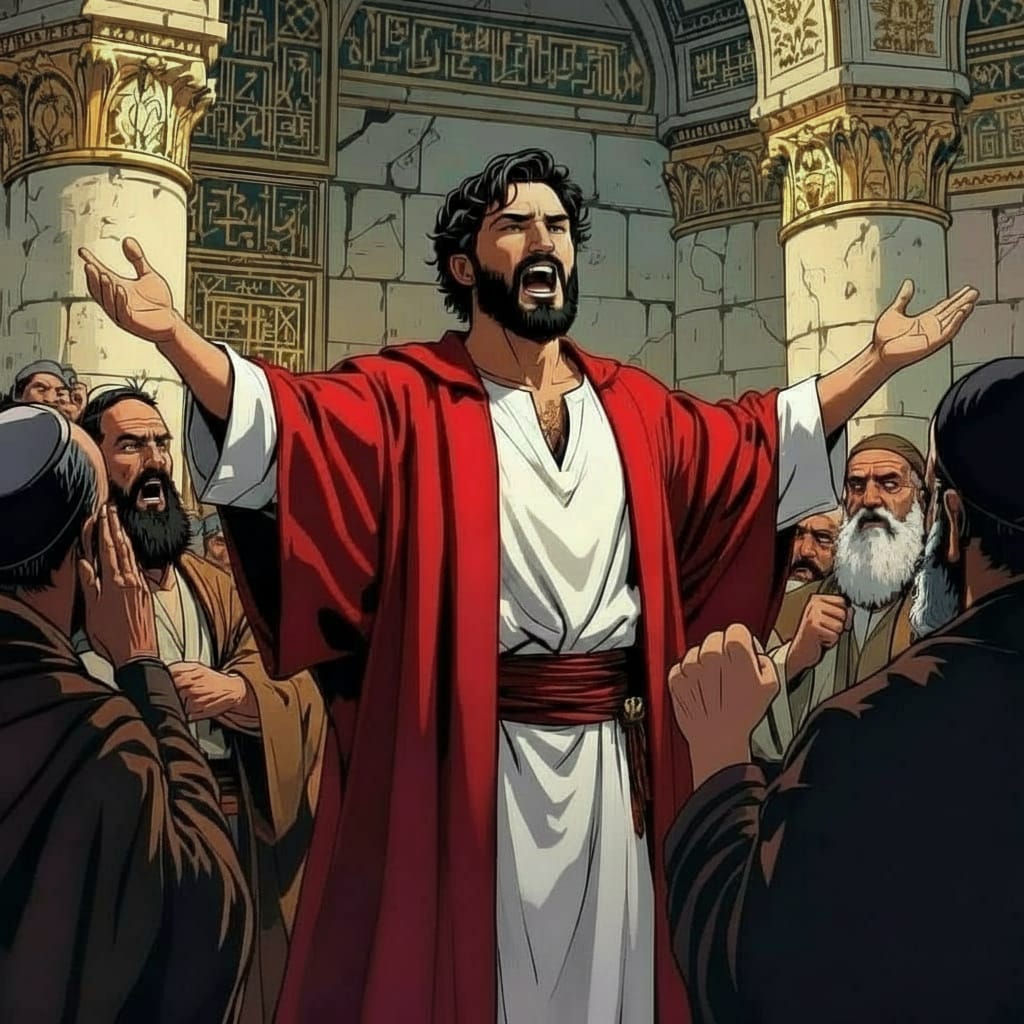
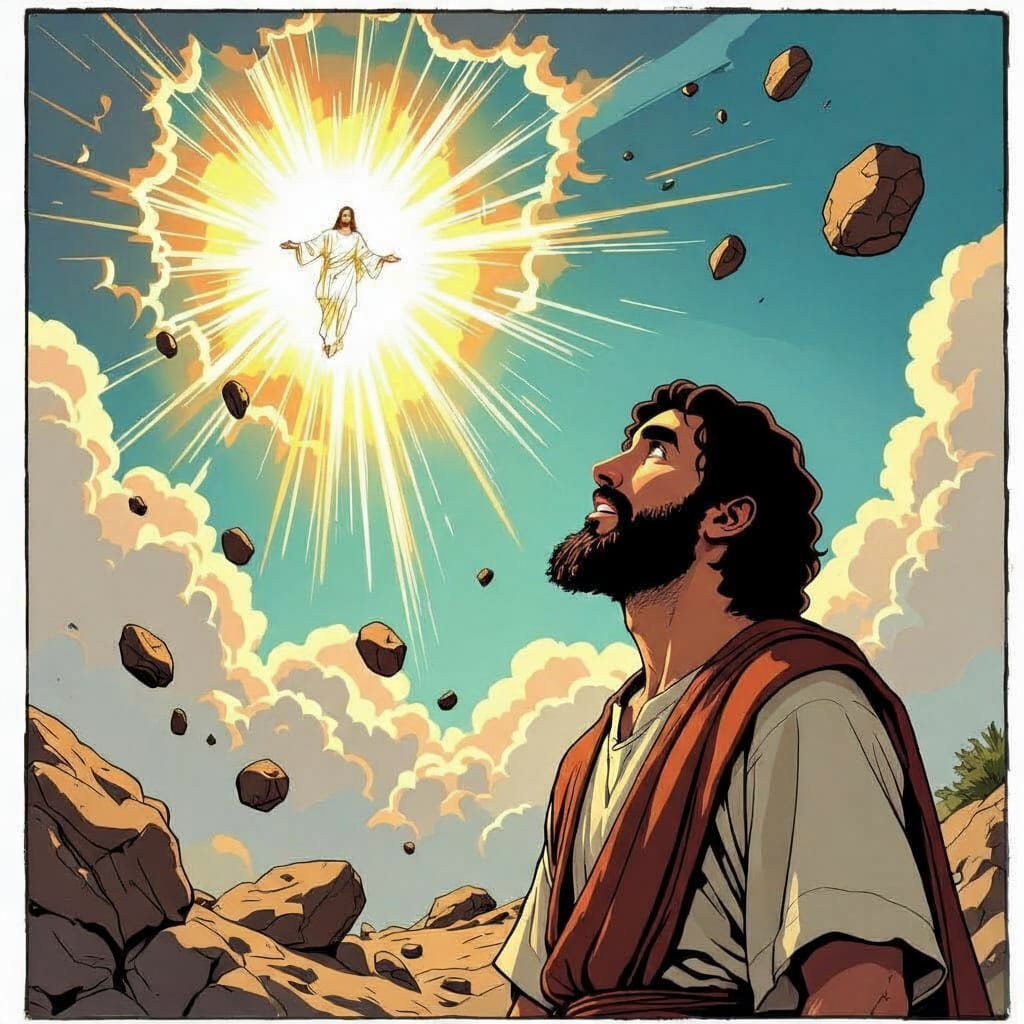
people had often resisted and doubted God over their history, and that the council was doing the same thing now. The religious leaders were cut to the heart, and became furious. Stephen then looked up into Heaven and saw the glory of God, and Jesus standing on the right hand of God. When he told them what he saw, they yelled, covered their ears, and charged at him. They dragged him out of the city. They laid down their clothes at the feet of a Pharisee named Saul, and stoned Stephen (threw rocks at him). As they did, Stephen asked Jesus to receive his spirit and to not hold their sin against them. When he said this, he died, becoming the first person to be martyred for preaching Christianity (Acts 7).
This stoning began a great persecution, led by Saul, against the church in Jerusalem. The disciples were scattered throughout the regions of Judaea and Samaria, but kept preaching Jesus (Acts 8:1-4).
Paul
As described in Stephen’s story, Paul (then Saul) consented to Stephen’s murder and scattered the followers of Jesus throughout the region as they tried to escape his extreme persecution. He started going house-to-house in Jerusalem, hauling away and imprisoning men and women who followed Jesus. Saul went to the high priest and asked for permission to do the same in Damascus. He received it and headed there with armed temple security. On the way, a light from Heaven shined on him and he fell to the ground. He heard a voice ask him why he was persecuting Him. Saul asked who He was, and He said He was Jesus. Saul was astonished, as were the men accompanying him. Saul was struck blind in the process, and the men with him led him to Damascus according to Jesus’ directions to Saul. There, he remained blind for three days. God appeared in a vision to a disciple named Ananius and told him to go to the house of Judas on Straight Street where Saul was staying and praying. God also told him that Saul has seen him coming in to lay hands on him and restoring his sight. Ananius had heard of the evil Saul had done to followers of Jesus and expressed his concern to God. God told him that Saul was a chosen vessel to take His (cont.)
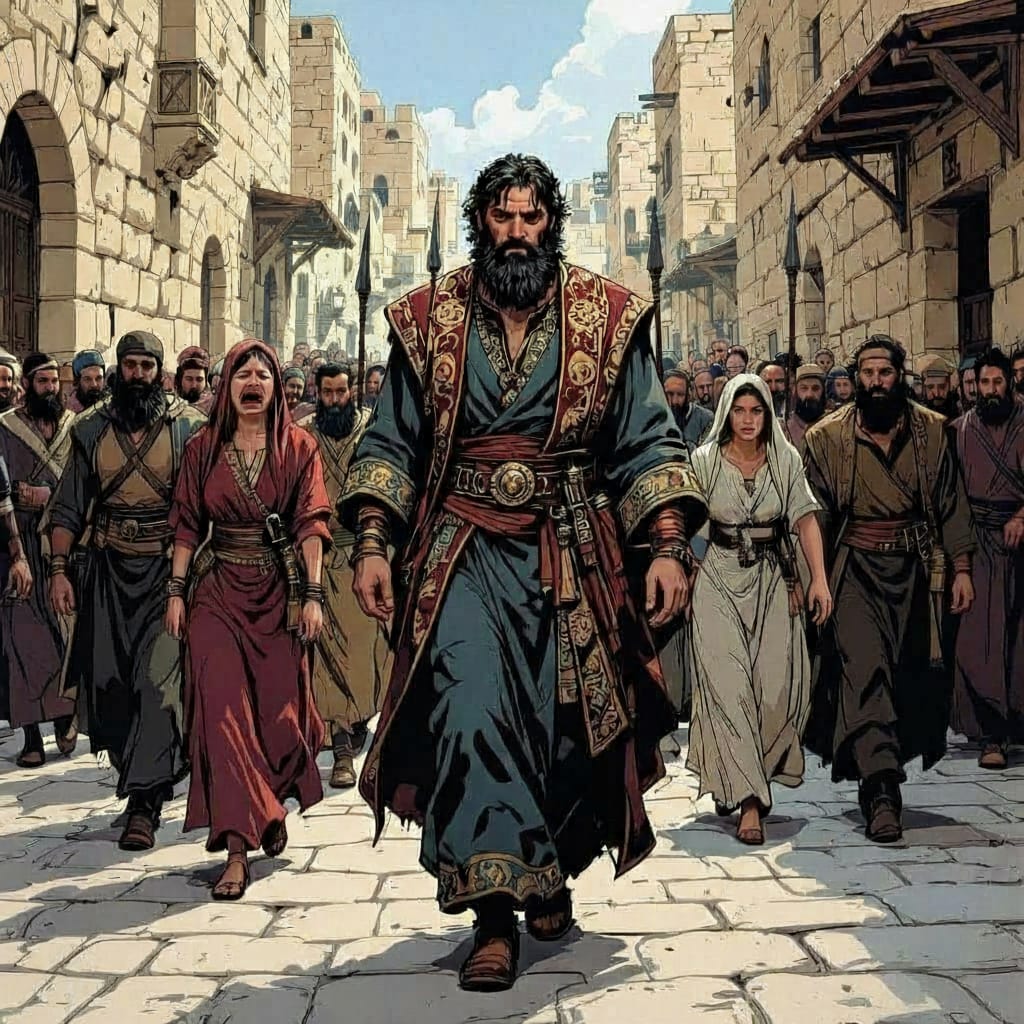
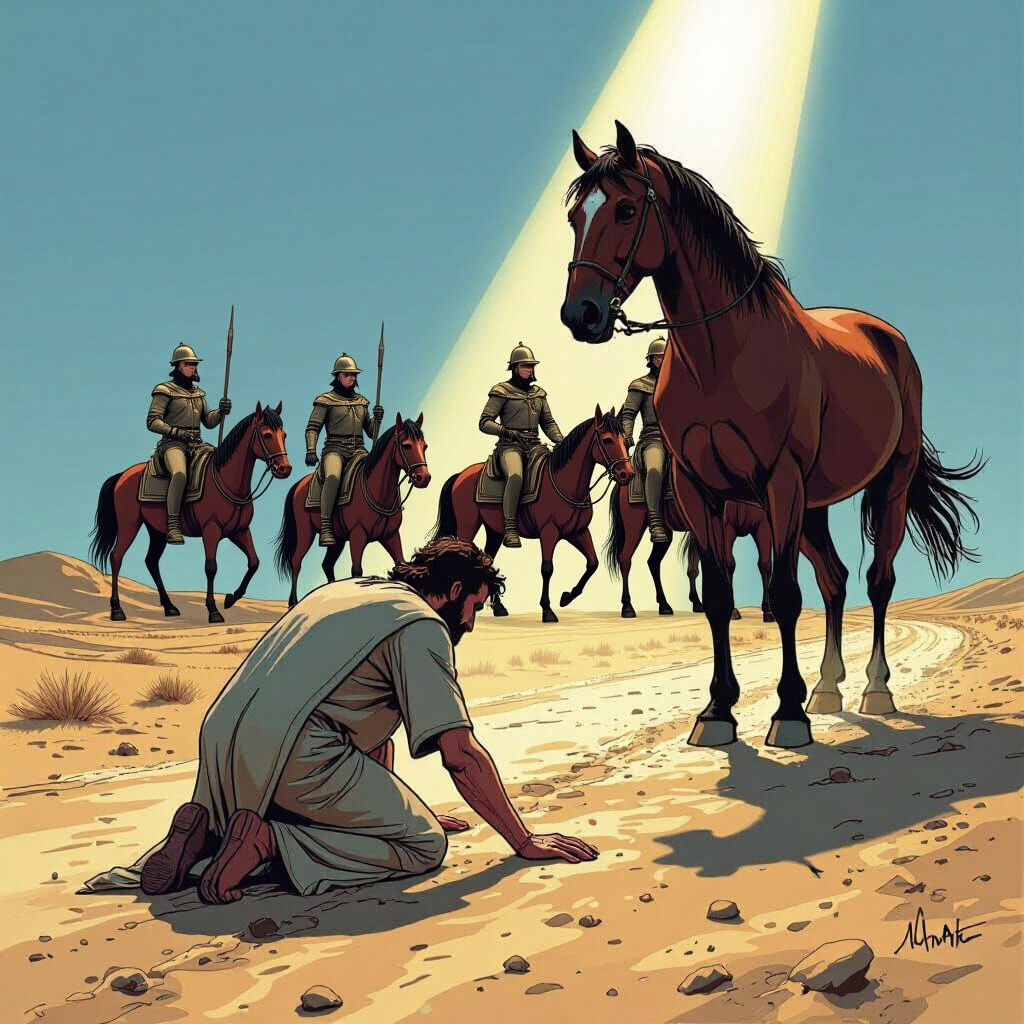
name to the Gentiles (non Jews), kings, and the people of Israel. Ananius went and did as the Lord commanded, and Saul received his sight, was filled with the Holy Spirit, and was baptized. He began preaching Jesus as the Son of God in the synagogues of Damascus, confounding everyone. After several days, the Jewish religious leaders plotted to kill him. He returned to Jerusalem by night, but the disciples there were afraid of him and didn’t believe he could really be a follower of Jesus after what he had done to them. The disciple Barnabas brought him to the apostles and detailed his miraculous conversion story and that he preached boldly the name of Jesus in Damascus. The disciples then accepted him, but his bold preaching quickly made him a target of the Grecians. who didn’t follow God at all. The disciples took him to safety in Tarsus, where the Gospel message flourished (Acts 8:1-4; 9:1-31).
At Antioch, after prayer and fasting, Barnabas and Saul were partnered in ministry and sailed to the island of Cyprus. There, in the city of Salamis, they preached in Jewish synagogues. After this, they were called to the city of Paphos by a Roman governor of the country, Sergius Paulus, who wanted to hear the word of God. (cont.)
But a Jewish false prophet and sorcerer named Barjesus, or Elymas by translation, tried to turn the governor away from the faith. Paul called him a child of the devil and struck him blind for a season. The governor watched in astonishment and believed on the Lord. Upon returning to Antioch, Paul preached a message on the sabbath in the synagogue that mirrored the one Stephen preached, starting with God delivering His people out of Egypt, all the way to the resurrection of Jesus, also quoting scripture, as Stephen had done. Many Jews believed, and also Gentiles, who brought back most of the city the next sabbath day. The Jewish leaders again became upset and spoke against Paul and Barnabas. Paul quoted the prophet Isaiah regarding being a light to the Gentiles and providing salvation to the ends of the Earth. The Gentiles were glad and many believed. However, the Jewish leaders turned the city leaders against them, so Paul and Barnabas were expelled from Cyprus. From there, they sailed to Iconium, now Konya, in modern-day Turkey. (Acts 13).
There, they spoke to a multitude of Jews and Gentiles. Many believed, but unbelieving Jews stirred up more trouble. They (cont.)
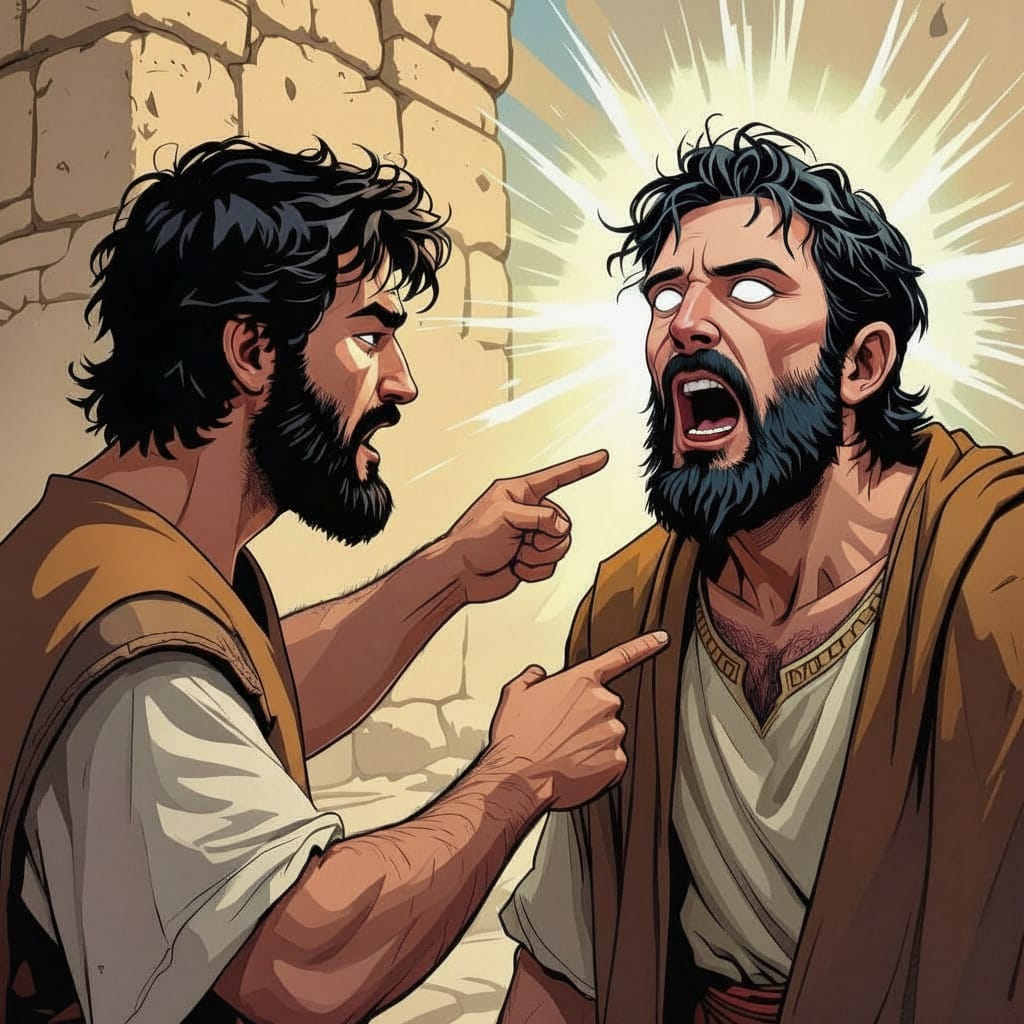
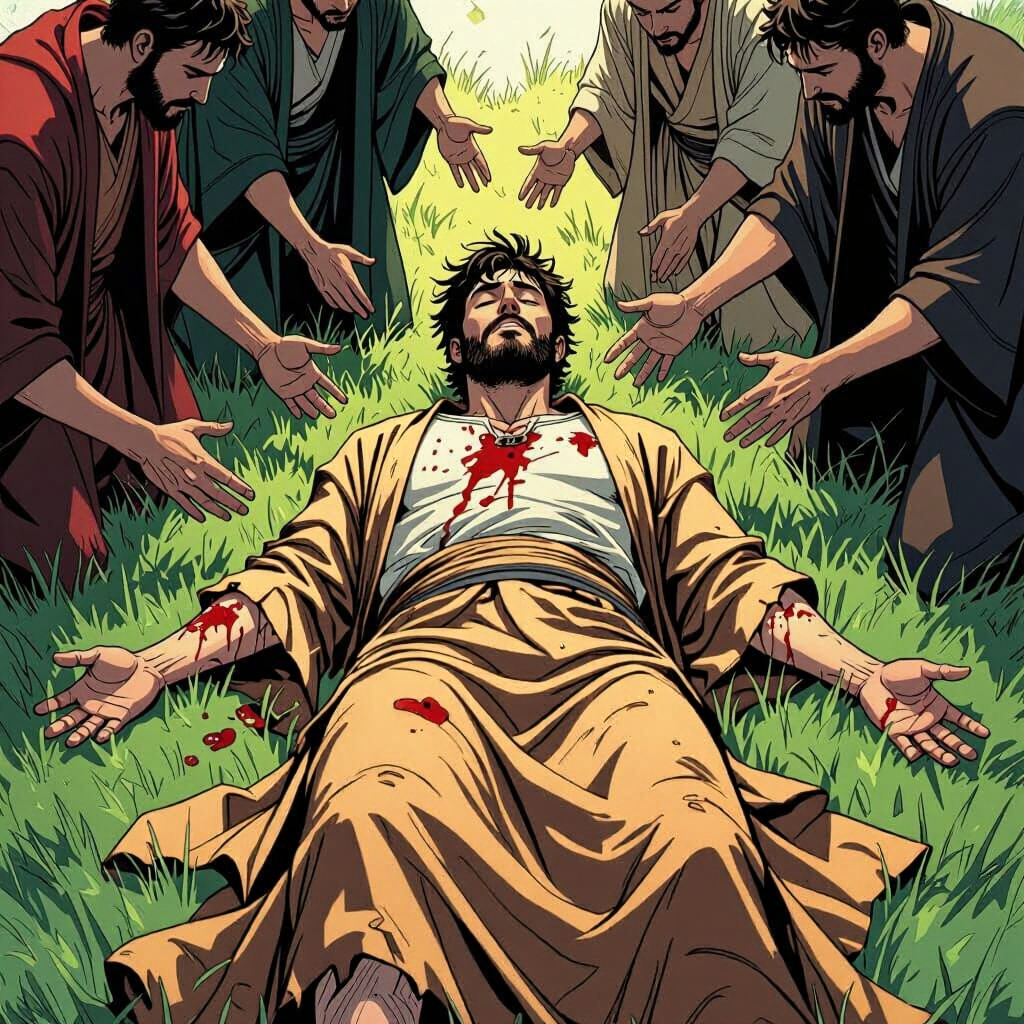
stayed there many days, however, and the Lord performed many signs and wonders through their hands before they left under more threats of death.
In Lystra, a man, crippled from birth, who had never walked, was spotted in the crowd by Paul. Perceiving the man to have faith, Paul called on him to stand up. The man leaped up and walked. The people thought they were their gods who had taken on human form, and tried to worship and make sacrifices to them. Paul and Barnabas told them they were just men who served the one living God which made heaven, Earth, the sea, and everything in them. This did little to stop their sacrifices, and Jews came from Antioch and Lystra, stoned Paul, and dragged him out of the city, believing he was dead. However, the disciples gathered around him and prayed, and he rose up and went with Barnabas to Derbe. Fourteen years later, Paul wrote about being taken to Heaven 14 years ago (2 Corinthians 12:2-4), which likely occurred during this near-death experience. In Derbe, they gained many disciples and returned to Lystra, Iconium, and Antioch to strengthen the disciples there and encourage them to keep the faith, even through persecutions (Acts 14).
Paul had a night vision of a man praying for him to go to Macedonia, a region in Greece, to help them, so he and Silas, his new ministry partner, went and to a city there called Philippi. On the sabbath, they went to a riverside for a women’s prayer meeting. A business woman named Lydia was there who served God and helped others, in addition to selling purple cloth. She was baptized and offered her home as a ministry base for the apostles in Philippi. One day, on the way to prayer, a slave girl possessed with a spirit of divination began following them and identifying them as followers of God. Paul eventually cast out the demon. However, she was a fortune teller for her masters who made money from her soothsaying, and they brought Paul and Silas before the city leaders. They were publicly whipped and thrown into prison with stocks locked on their feet. At midnight, Paul and Silas prayed and sang praises to God, and other prisoners heard them. Then there was a sudden earthquake which shook the foundations of the prison. All the prison doors and everyone’s bonds were opened. The guard woke up, saw the open doors, and drew his sword to kill himself, assuming everyone escaped and he would be killed for his failure to secure them. (cont.)
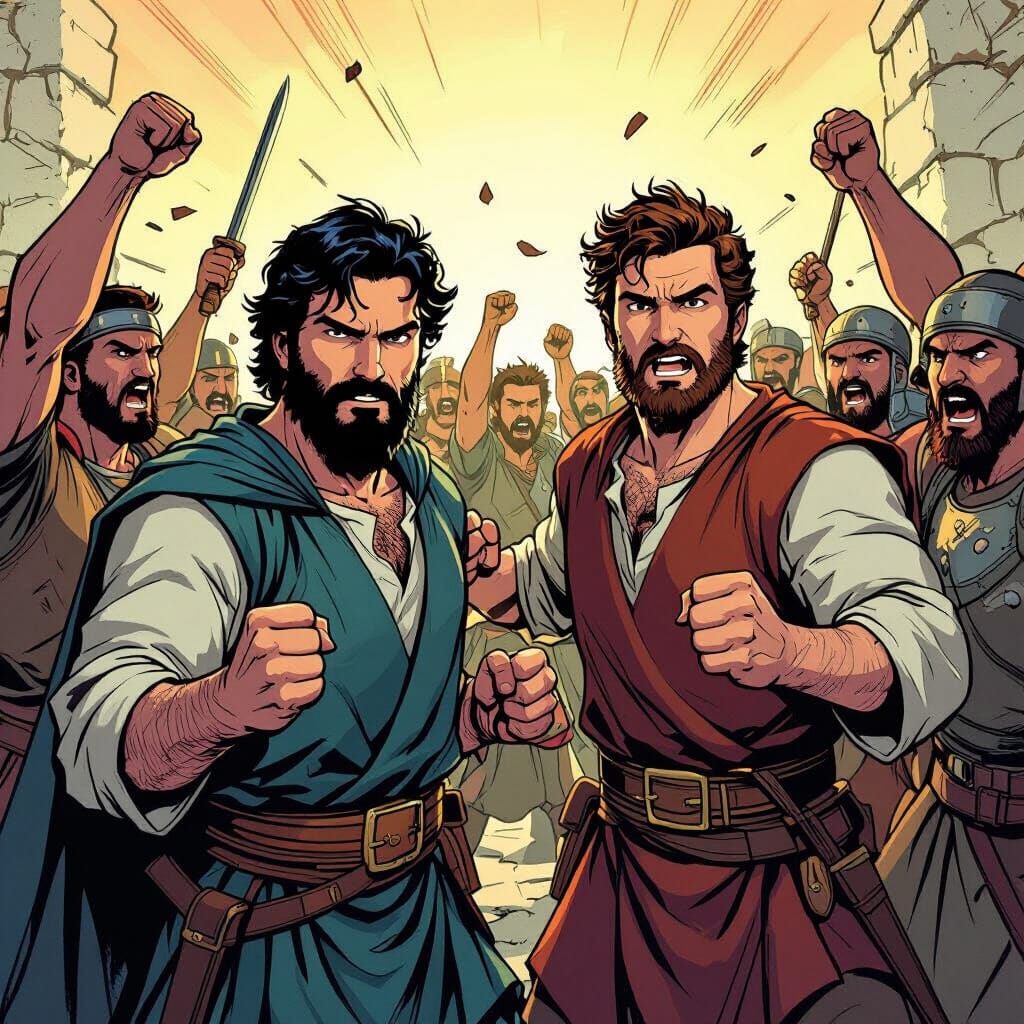
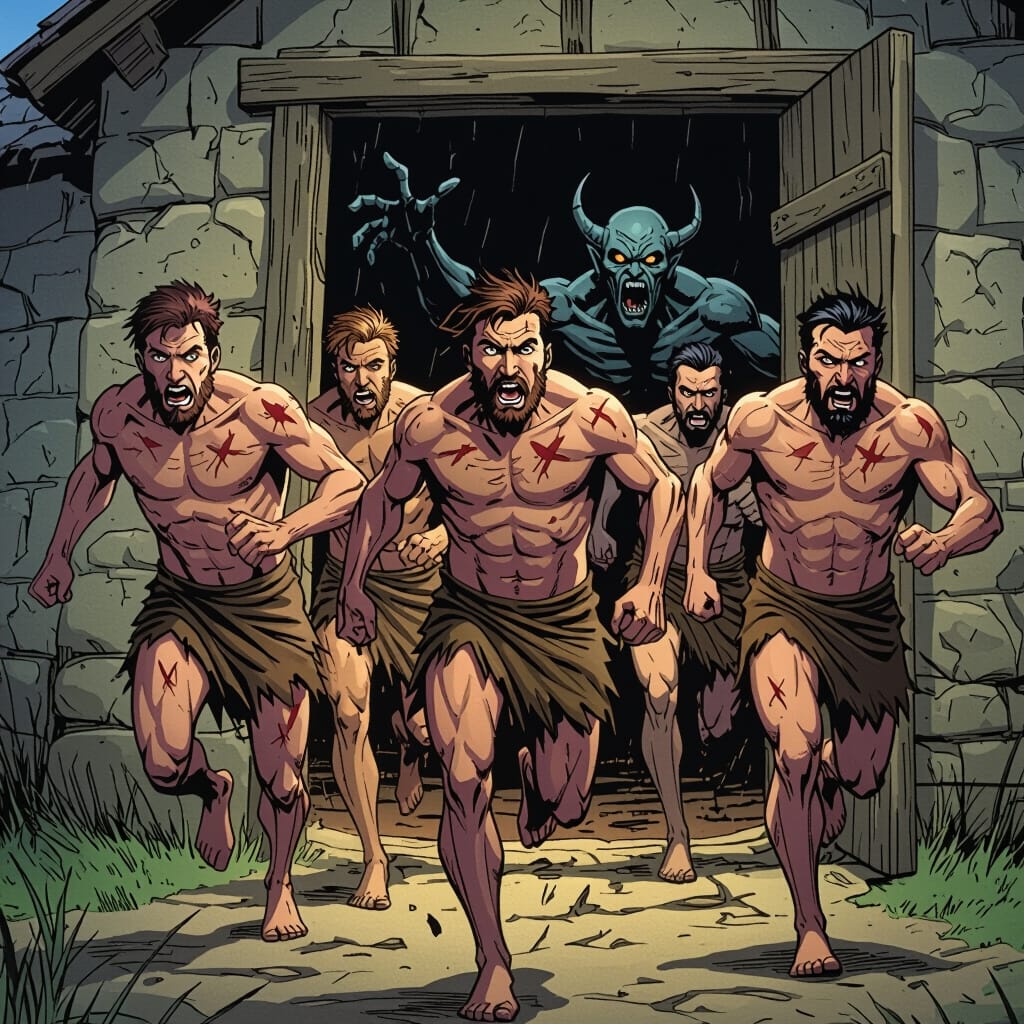
But Paul called out and let him know everyone was still there. He asked Paul and Silas how he could be saved. They went to the guard’s house and preached Jesus to him and his family and they all believed on Him. They returned to the prison and were released the next day (Acts 16).
After receiving opposition from Jews in the synagogue at Ephesus (a major city on the west coast of present-day Turkey), Paul ministered for two years at the school (likely a lecture hall) of Tyrannus. This resulted in the Gospel spreading throughout Asia as God did unusual miracles through him. Paul anointed handkerchiefs and aprons which were taken to sick and demon-possessed people and they were healed and delivered. A group of brothers and a Jewish priest, who didn’t follow Jesus, tried to cast out a demon by Jesus, who Paul preached, and the demon told them he knew Jesus and Paul, but not them, and beat up the whole group of them. They fled the house wounded with their clothes ripped off. This incident became known to everyone in Ephesus, and the name of Jesus was promoted even more. Many involved in witchcraft burned their spell books, totaling a value of 50,000 pieces of silver (Acts 19:1-20).
Not long after, Paul journeyed to the port city of Troas, in modern-day Turkey. There, in an upper chamber, the disciples shared a meal and Paul preached until midnight. A young man named Eutychus sat in the window and fell asleep due to the late-night preaching. From the third floor, he fell to the ground and died. Paul went down to him and embraced him, and he arose from the dead. Paul went back up and ate while talking until daybreak (Acts 20:6-12).
Back in Jerusalem, near the end of Paul’s ministry, the Jewish High Priest and chief leaders petitioned The Roman governor, Festus, to take Paul in for questioning over his perceived crimes. Festus went to Caesarea, as did the Jewish accusers, and he called Paul to stand before his judgement seat, where his accusers made many complaints, but couldn’t prove any of them. Paul defended himself and appealed to Caesar, the Roman Emperor, Nero. Before being sent to Caesar, Festus brought Paul before King Agrippa of Judaea, who was visiting Festus, in order to determine the charges to be filed against Paul (Acts 25).
Paul preached to him in an auditorium full of the king’s commanders and the prominent men of the city, detailing his life story. (cont.)

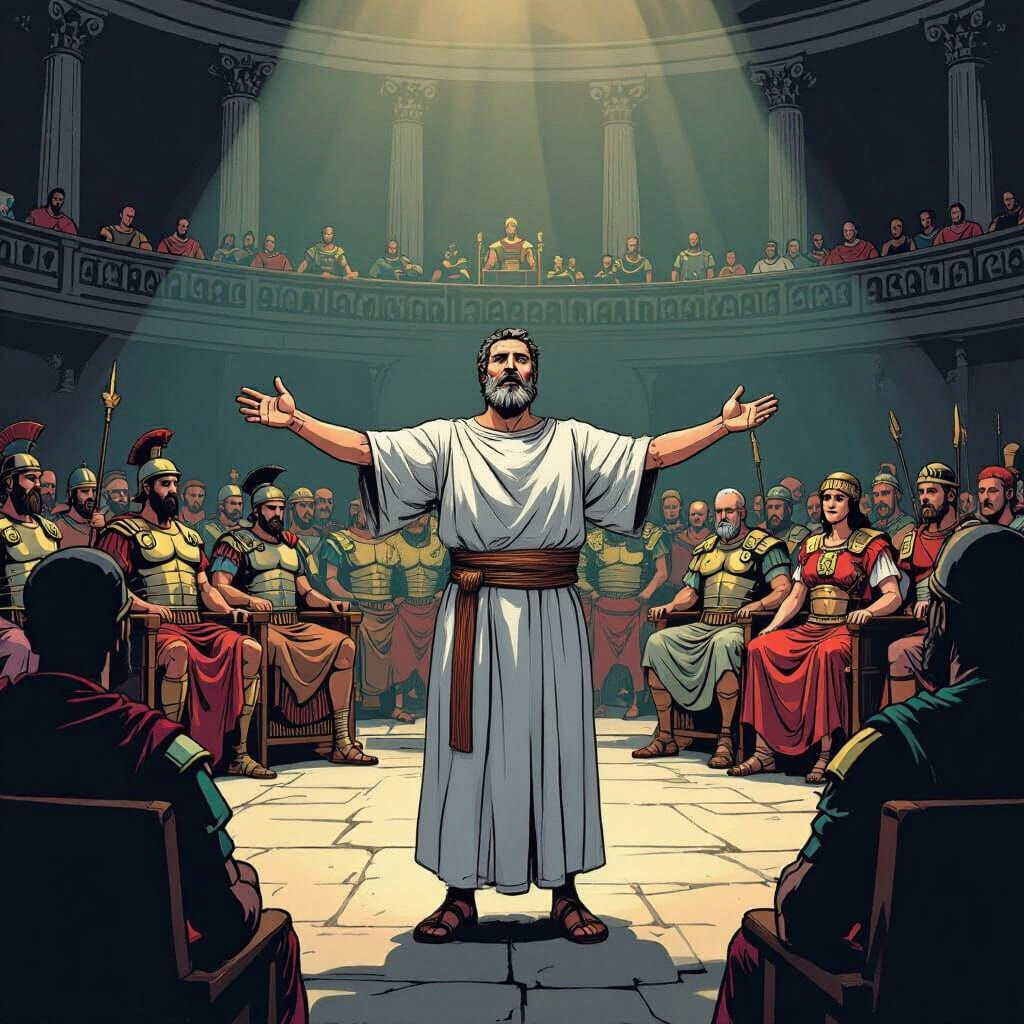
Telling how he was a Pharisee who persecuted and jailed followers of Jesus, and voted for death in their trials. He then told of his miraculous conversion on the road to Damascus. And the message of salvation through the sacrifice of Jesus on the cross for all mankind’s sin. He even asked the king if he believed these things. The king said Paul almost persuaded him to become a Christian (Acts 26).
Paul, and other prisoners, were put on a ship to Rome along the coast of of Asia. Under the watch of a centurion of the Augustan Regiment, named Julius. They switched ships in Myra of Lycia, to an Alexandrian ship sailing to Italy. The wind became an issue which slowed them down. Paul perceived, and told the centurion, that the voyage would end in disaster, but he disregarded his warning. Sure enough, a serious head wind arose and they sought shelter and began throwing things overboard to lighten the ship. The storm continued for many days and most gave up hope of survival. But Paul gave them another message: that there would be no loss of life, only the ship, if they run aground on a certain island. For an angel of God had appeared to him and told him so. On the fourteenth (cont.)
night, the sailors lowered a skiff to escape from the ship against Paul’s directions. Paul called on the centurion and soldiers to cut away the skiff as the only way they could be saved. They did, and the next morning, Paul instructed everyone to eat in order to survive the remainder of the struggle. After eating, they lightened the ship further, let go the anchors, and ran the ship aground. All 276 people escaped safely to land (Acts 27).
The island on which Paul and the others were shipwrecked was called Malta. The natives showed them unusual kindness and kindled a fire for the stranded guests. Paul gathered a bundle of sticks and laid them on the fire. A viper came out and fastened on his hand. The natives saw this and believed Paul was a murderer who deserved to die, despite having survived the sea. But Paul shook off the snake into the fire. The natives watched him, expecting him to swell up or drop dead, but after he experienced no ill effects over time, they believed he was a god. They stayed at the estate of the leading citizen on the island, named Publius, who hosted them for three days. Also there, was Publius’ father, who had a fever and dysentery. Paul prayed and laid hands on him and (cont.)
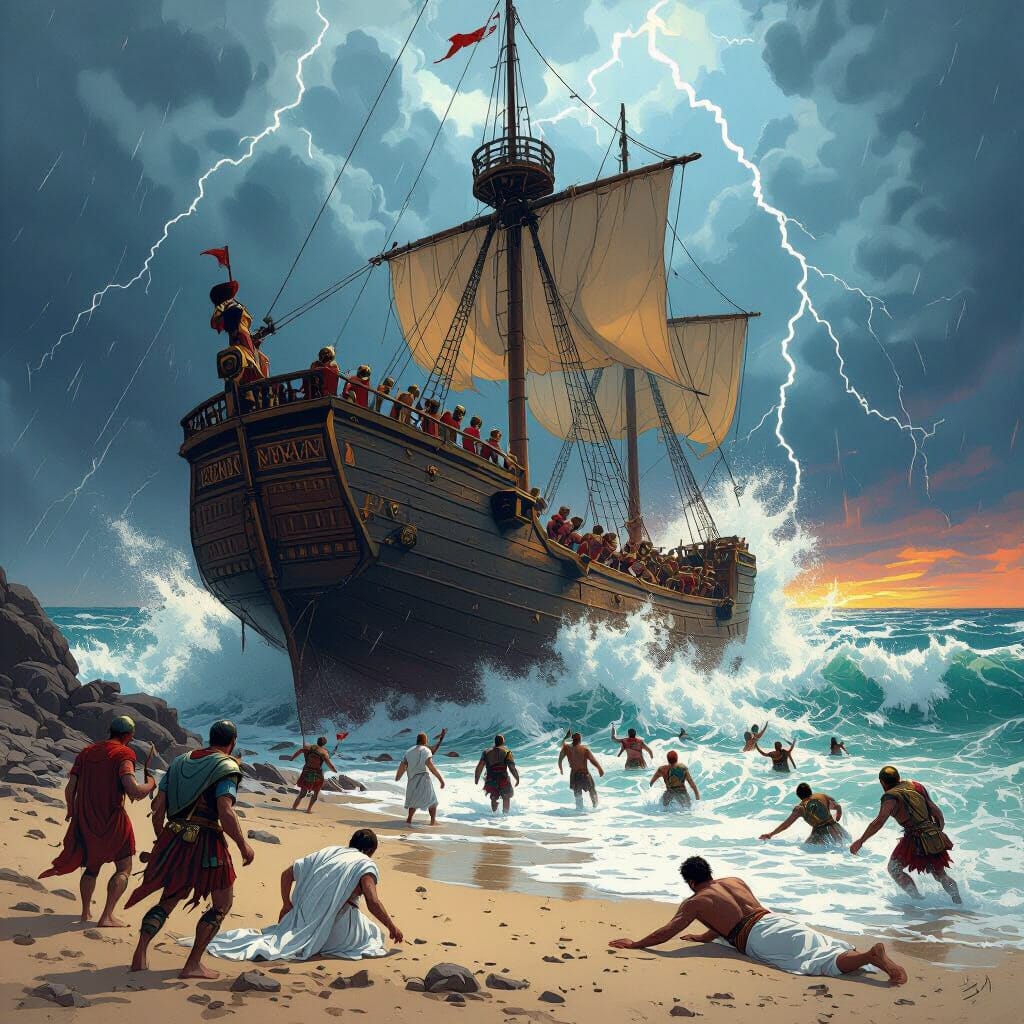
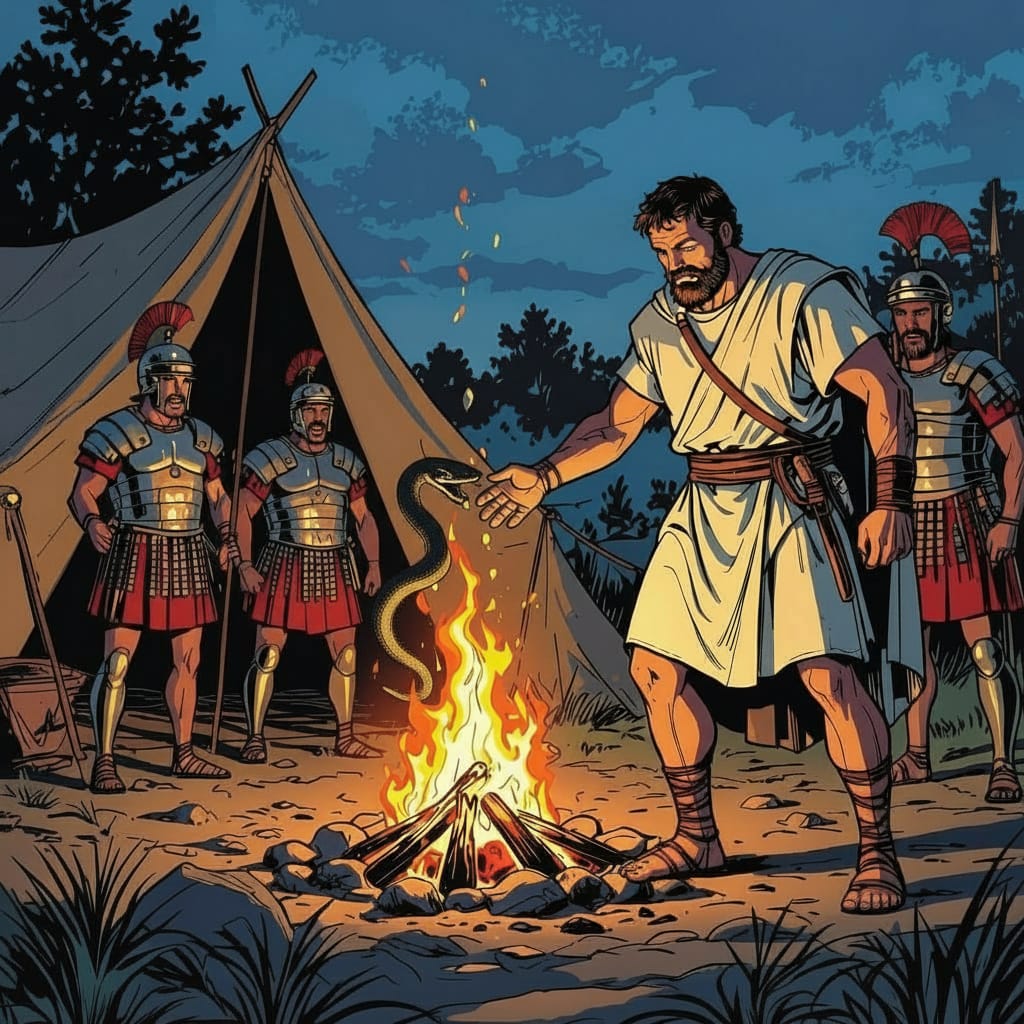
he was healed, leading to every sick and diseased person on the island coming to him and being healed. After three months, they sailed to their destination in a ship which had wintered on the island. Once in Rome, the centurion delivered the prisoners to the captain of the guard, except for Paul, who was allowed to stay with just the soldier who guarded him. This gave Paul the opportunity to gather with the Jewish leaders and share his story, which they hadn’t heard, except that the sect of Christianity was spoken against everywhere. He preached to them from morning to evening, expounding on the law of Moses and the prophets, to the kingdom of God that was now available to everyone. Some believed and some didn’t. They were especially conflicted when Paul told them that this salvation of God has been sent to the Gentiles, as well. Paul spent two years there on house arrest, where he preached the Gospel of Jesus Christ boldly to all who came to him, with no one opposing him (Acts 28). It is believed he was then released, but later imprisoned again in Rome and beheaded by Emperor Nero around 67 AD.

